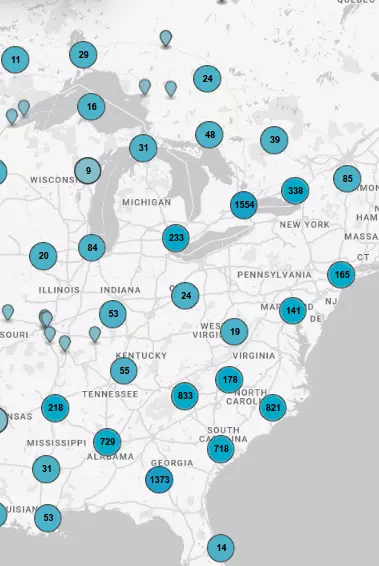West Michigan Summer Resorts / Jewish Resorts
After the American Civil War (1861-1865) a new wealthy class arose with the time and means to escape the grime of industrialized cities for the summer “Season.” In the 1870s the Little...
- michigan
- michigan his...
Inland Waterway
The glaciers of the last Ice Age retreated to the north some twenty-five thousand years ago, leaving behind the lakes that rank as Michigan’s most notable geographical feature. Among the...
- michigan
- michigan his...
First Presbyterian Church
This church was organized in 1829, one of the oldest Presbyterian groups in the state. The sanctuary, completed in 1849, is largely the work of the Reverend John Monteith, who preached...
- michigan
- michigan his...
Erwin Central School
In 1909 the newly formed Erwin Township School District built this one-room schoolhouse. The school served the area’s Finnish-born mining, logging, and farming families. The township bought the...
- michigan
- michigan his...
Stockton House / Thomas Stockton
The November 9, 1872, edition of the Flint Wolverine Citizen newspaper reported the near completion of this house for retired army colonel Thomas Stockton and his wife, Maria. The newspaper called...
- michigan
- michigan his...
This Tree Dedicated to the Memory of the Grand Army of the Republic
THIS TREE DEDICATED TO THE MEMORY OF THE GRAND ARMY OF THE REPUBLIC BY LOOKOUT MOUNTAIN RELIEF CORP NO 35APRIL 6, 1924
- berkeley
- grand army o...
- 1924
- civil war
Le Cote' Du Nord-Est
After founding Detroit in 1701 the Sieur de Cadillac divided the land northeast of Fort Pontchartrain into long, narrow “ribbon” farms each fronting on the river. The first settlers, thus, had...
- michigan
- michigan his...
Alpena County Courthouse
“Alpena has blazed a new trail in construction,” architect William H. Kuni of Detroit declared at the opening of the Alpena County Courthouse on October 21, 1935. Calling it “the first...
- michigan
- michigan his...
Paddock-Hubbard House / Paddock- Hubbard House
In 1843 New York natives Alfred and Ruth Paddock migrated to Concord Township. Within two years they erected this Greek Revival house, reminiscent of those in their home state. A...
- michigan
- michigan his...
Holy Childhood of Jesus School
This Indian school was founded in 1829 by Father Pierre Déjean, who came here with two teachers, Miss Elizabeth Williams and Joseph L’Etorneau. The Indians built a church and the first...
- michigan
- michigan his...
Anna Howard Shaw / Anna Howard Shaw
As a child in 1859, suffragist Anna Howard Shaw (1847-1919) moved with her family from Massachusetts to Mecosta County. Her father soon returned east with two of his sons, leaving behind his wife...
- michigan
- michigan his...
Old Wayne Village Hall
Since 1878 the Old Wayne Village Hall has served as the center of civic affairs in Wayne. It is one of the few surviving Second Empire-style buildings in Wayne County. The first meeting of the...
- michigan
- michigan his...
Wixom Cemetery
The Wixom Cemetery has been in continuous use since 1838, when it was established as the South Commerce Burial Ground. The first burial, however, that of an infant named Israel Barrett,...
- michigan
- michigan his...
Larke Road
Until 1962 Three Mile (Larke) Road was known simply as Larke Road. In 1876 Henry Larke (1824-1900) became the first settler along this road, making his home about one and one-half miles west of...
- michigan
- michigan his...
Northern Michigan University
Established by the legislature in 1899 as a normal school to provide teachers for the Upper Peninsula, Northern opened with thirty-two students, six faculty members, and Dwight B. Waldo as...
- michigan
- michigan his...
Coloma Interurban Station
Built in 1910 by the Benton Harbor-St. Joe Railway and Light Company, this station served passengers and freight until 1928. The station’s transformer provided Coloma’s first source of...
- michigan
- michigan his...
Cooke Hydroelectric Plant
William Augustine Foote, a Jackson entrepreneur, built a series of hydroelectic plants along the Au Sable River with the help of his brother, electrical engineer James Berry Foote. The...
- michigan
- michigan his...
Beginning of State Reforestation
A concern over the depletion of Michigan’s forests led in 1899 to the creation of a forestry commission. In 1903 the first state forest was set up by the legislature on cutover, burned-over lands...
- michigan
- michigan his...
Kempf House
Cast iron grilles in an ancient Greek floral motif highlight the frieze of this temple-front Greek Revival house. Built in 1853 for Henry D. Bennett, secretary and steward of the University...
- michigan
- michigan his...
Sault Ste. Marie
This city, the oldest in the Midwest, grew up about the mission of Fathers Dablon and Marquette, founded in 1668 on the banks of the rapids through which Lake Superior’s waters commence their...
- michigan
- michigan his...
